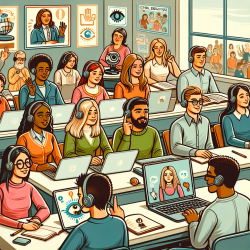In the realm of health professions education (HPE), there is a growing recognition of the need to dismantle entrenched Eurocentric structures to foster equity and social justice. The article "Dismantling the Master’s House: New Ways of Knowing for Equity and Social Justice in Health Professions Education" offers valuable insights that can be instrumental for practitioners in online therapy services, such as those provided by TinyEYE. This blog post explores key outcomes of the research and suggests ways to implement these findings to improve online therapy practices.
Understanding the Colonial Matrix of Power
The concept of the Colonial Matrix of Power, as discussed in the article, highlights how modern HPE is rooted in Eurocentric epistemologies that perpetuate inequities. This matrix centers on knowledge, racism, patriarchy, and capital, creating interdependent spheres of power that uphold and reproduce global power structures. For online therapy practitioners, understanding this matrix is crucial for recognizing and addressing systemic inequities in their practice.
Addressing Epistemic Injustice
Epistemic injustice occurs when certain ways of knowing are marginalized or invalidated. In the context of online therapy, this could manifest as the dismissal of non-Western therapeutic approaches or the undervaluing of client experiences due to implicit biases. Practitioners can counteract this by:
- Incorporating diverse therapeutic methodologies that recognize and validate different cultural and epistemic perspectives.
- Engaging in continuous professional development to become aware of and challenge their own biases.
- Creating an inclusive environment where clients feel their experiences and knowledge are respected and valued.
Implementing Intersectional Approaches
Intersectionality, a key theme in the article, refers to the interconnected nature of social categorizations such as race, gender, and class, which create overlapping systems of discrimination. Online therapy practitioners can implement intersectional approaches by:
- Assessing and addressing the unique needs of clients who may experience multiple forms of oppression.
- Providing training for therapists on the importance of intersectionality in understanding client experiences and developing tailored interventions.
- Promoting policies and practices within their organizations that support equity and inclusivity.
Fostering Reflexivity and Critical Reflection
The article emphasizes the importance of reflexivity and critical reflection in dismantling the Master’s House. For online therapy practitioners, this means regularly reflecting on their own practices and the broader systemic structures that influence their work. Steps to foster reflexivity include:
- Engaging in peer supervision and discussions to challenge and refine therapeutic approaches.
- Utilizing reflective journals to document and analyze their experiences and biases.
- Participating in workshops and training sessions focused on equity and social justice.
Encouraging Further Research
The research presented in the article underscores the need for ongoing inquiry into how equity and social justice can be integrated into health professions education and practice. Online therapy practitioners are encouraged to:
- Conduct and participate in research that explores diverse therapeutic approaches and their impact on different client populations.
- Collaborate with academic institutions and other organizations to develop evidence-based practices that promote equity and social justice.
- Share their findings and experiences with the broader professional community to contribute to the collective knowledge base.
Conclusion
By implementing the outcomes of the research presented in "Dismantling the Master’s House," online therapy practitioners can enhance their skills and provide more equitable and just services. This involves understanding the Colonial Matrix of Power, addressing epistemic injustice, implementing intersectional approaches, fostering reflexivity, and encouraging further research. To read the original research paper, please follow this link:
Dismantling the master’s house: new ways of knowing for equity and social justice in health professions education.










